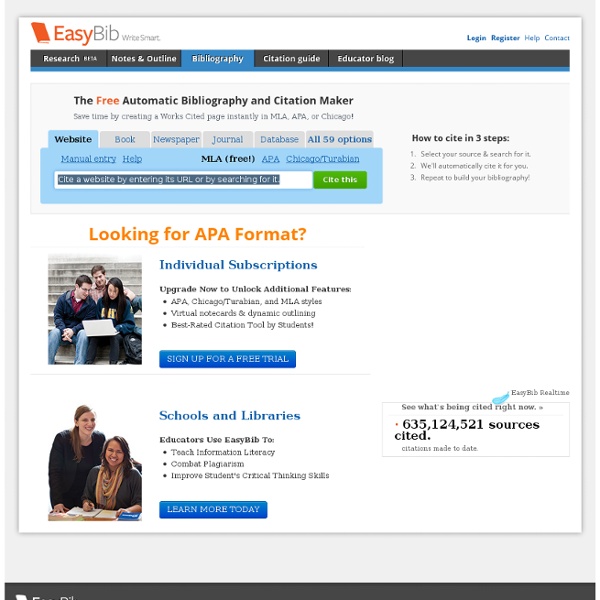



http://www.easybib.com/index/index2
The CIA World Factbook People from nearly every country share information with CIA, and new individuals contact us daily. If you have information you think might interest CIA due to our foreign intelligence collection mission, there are many ways to reach us. If you know of an imminent threat to a location inside the U.S., immediately contact your local law enforcement or FBI Field Office. Power Poetry Our Data Check out our awesome data on Power Poetry and our poets. Meet the Power Poetry team and discover what we do. Welcome!
RSS Feed Search Engine Instant RSS Search engine will help you discover RSS feeds on the web around your favorite topics. You may use the tool to search RSS feeds for blogs, news websites, podcasts and more. It is instant search and hence the search results display as you type. You may use any of the Google search operators - like allintitle, inurl, etc. - for more accurate results. You can subscribe to the feeds in your favorite RSS Reader (like Feedly) or use the Preview link to see the 10 most recently published articles from that feed. Avoiding Plagiarism: Quoting and Paraphrasing Use the menu below to learn more about quoting and paraphrasing. Download this handout College writing often involves integrating information from published sources into your own writing in order to add credibility and authority--this process is essential to research and the production of new knowledge. However, when building on the work of others, you need to be careful not to plagiarize: "to steal and pass off (the ideas and words of another) as one's own" or to "present as new and original an idea or product derived from an existing source."1 The University of Wisconsin takes very seriously this act of "intellectual burglary," and the penalties are severe. These materials will help you avoid plagiarism by teaching you how to properly integrate information from published sources into your own writing.
Lesson Overview | Does the emphasis on reading “informational text” in the new Common Core State Standards set up a “fiction versus nonfiction smackdown” in English classes? If so, is that good or bad? In this lesson, students will reflect on their reading experiences in and out of school and discuss the roles that both nonfiction and fiction have played. Then, they will become familiar with what the Common Core standards say about reading, and what critics and supporters have written in reaction, in order to discuss and write about the question “What Should Children Read?” Materials | Our Reading Questionnaire handout Warm-Up | Ask students to complete our Reading Questionnaire (PDF) to begin thinking about their own reading histories, habits and preferences — and about the roles of fiction and nonfiction in their lives.
Next Vista for Learning OWL Coming Soon: A new look for our same great content! We're working hard this summer on a redesign of the Purdue OWL. Worry not! Our navigation menu and content will remain largely the same. If you are having trouble locating a specific resource, please visit the search page or the Site Map. Understanding Language In the first lesson in this unit, students are introduced to the use of persuasion in visual, print, and multimodal advertisements. Many advertisements, particularly video, embed persuasive techniques in the familiar genre of narrative first to inform, engage, and interest readers and viewers emotionally, and then to persuade them to take some form of action. This action may be to buy a product, sign a petition, attend an event, or change their behavior. Sometimes the purpose is to raise awareness of an issue –the action or response required is not always made explicit. This lesson explores how the use of persuasive techniques within the narrative of advertisements accomplishes these goals.
Northwestern University's Knight Lab The Plagiarism Spectrum Preventing plagiarism in the Digital Age GUEST COLUMN | by Jason Chu Summer 2012 was awash in breaking news of journalistic misconduct, punctuated with the exposure of Jonah Lehrer’s and Fareed Zakaria’s acts of plagiarism (for a full review of the “Summer of Sin,” see Craig Silverman’s post on Poynter.org[1]). Though the “Summer of Sin” came to an end, the Fall brought with it more bad news with cases of cheating at both Stuyvesant High School and renowned Harvard University coming to light. The breaking news, as such, regarding the current state of our journalistic and academic integrity paints a pretty bleak picture. If shame, embarrassment, and career suicide are not enough to keep professionals who traffic in facts from staying on the straight and narrow, what can be done to curb this behavior, especially among students?
Search - Search for Readable Results Building Blocks of Language: The Eight Parts of Speech Tutorial 1. It is always helpful to be able to place items in categories in order to MAKE SENSE OF WHAT YOU ARE STUDYING. We place foods in categories (fruits, vegetables, grains, etc.). We place sports in categories (individual or team sports, contact or non-contact sports, etc.). We place subject matter in categories (math, science, language arts, etc.).
Sweet Search Word Information - an English dictionary about English vocabulary words and etymologies derived primarily from Latin and Greek word origins